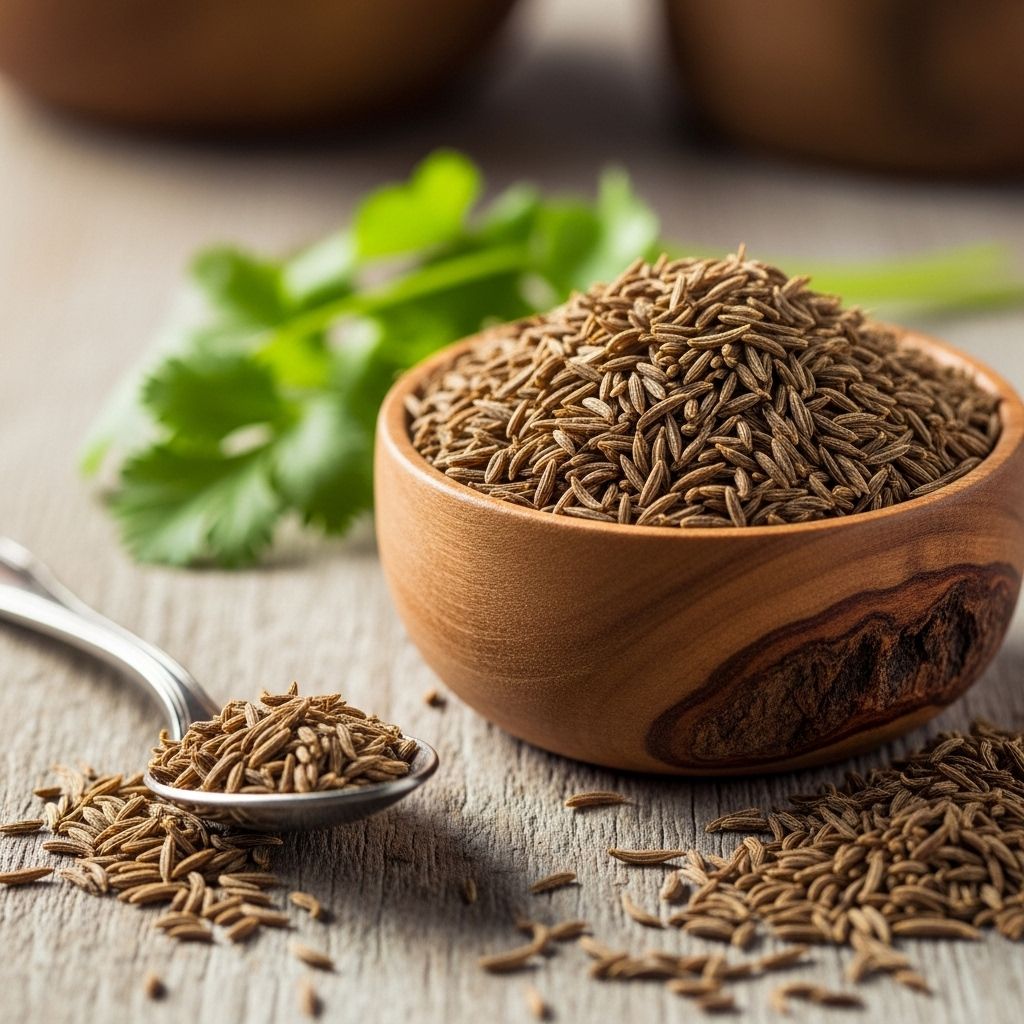Cumin Seed: Flavor, Uses & Easy Substitutes
Exploring the Flavorful World of Cumin Seeds

Cumin seeds are a staple spice in many cuisines around the world, particularly in Mexican, Indian, and Middle Eastern cooking. They provide a warm, earthy flavor that enhances the taste of various dishes. Beyond their culinary uses, cumin seeds offer several health benefits, making them a valuable addition to both cooking and wellness routines.
Table of Content
- Introduction to Cumin Seeds
- Culinary Uses of Cumin Seeds
- Health Benefits of Cumin Seeds
- Easy Substitutes for Cumin Seeds
- Frequently Asked Questions (FAQs)
Introduction to Cumin Seeds
Cumin seeds are obtained from the plant Cuminum cyminum, which belongs to the parsley family. They are small, oblong seeds with a brown or greenish-brown color and possess a distinctive nutty flavor. Cumin seeds have been used for centuries in traditional medicine and cooking for their numerous benefits.
Culinary Uses of Cumin Seeds
Cumin seeds are incredibly versatile and can be used in a variety of dishes, from soups and stews to salads and marinades. Here are some popular ways to incorporate cumin seeds into your cooking:
- Salads and Dips: Cumin seeds can be used as a garnish or mixed into dips like hummus or guacamole for added flavor.
- Curries and Stews: Whole cumin seeds are often toasted to release their aroma before being added to curries or stews.
- Mexican Cuisine: Cumin seeds are a key ingredient in many Mexican dishes, such as tacos, chili con carne, and enchiladas.
- Indian Recipes: Whole cumin seeds are commonly used in Indian recipes like curries, chutneys, and dals.
- Tea and Beverages: Cumin seed tea is a popular remedy for digestive issues and is made by infusing whole seeds in hot water.
Health Benefits of Cumin Seeds
Beyond their culinary value, cumin seeds offer several health benefits. They are rich in antioxidants, which help protect the body from oxidative stress. Here are some key health benefits of cumin seeds:
- Digestive Health: Cumin seeds aid digestion by stimulating the secretion of enzymes that help break down food. They also have carminative properties, which can help reduce bloating and gas.
- Immune System Boost: Cumin seeds contain vitamin C and other antioxidants that help boost the immune system and fight off infections.
- Weight Loss Support: High in fiber, cumin seeds can help you feel fuller for longer, reducing cravings and aiding in weight loss efforts.
- Antioxidant Properties: Cumin seeds are rich in antioxidants, which can help reduce the risk of heart disease and other chronic conditions.
Easy Substitutes for Cumin Seeds
In some recipes, you might need substitutes for cumin seeds. Here are a few options:
- Coriander Seeds: While not identical, coriander seeds share a similar earthy flavor and can be used as a substitute in many recipes.
- Paprika: For a slightly smoky flavor, paprika can be used as a substitute in some dishes.
- Chili Powder: If you’re looking for a more intense flavor, chili powder can add a spicy kick, but it lacks the earthy taste of cumin.
Frequently Asked Questions (FAQs)
Q: Are cumin seeds safe to eat whole?
A: Yes, cumin seeds are safe to eat whole. They can be used as a garnish or added directly to dishes for flavor.
Q: Can cumin seeds help with weight loss?
A: Cumin seeds can support weight loss efforts by increasing satiety due to their high fiber content and potentially boosting metabolism.
Q: How do I store cumin seeds to preserve their flavor?
A: Cumin seeds should be stored in an airtight container in a cool, dry place to maintain their flavor and aroma.
Q: Can cumin seeds be used in teas or infusions?
A: Yes, cumin seeds can be used to make tea or infusions that help with digestion and provide other health benefits.
References
- https://draxe.com/nutrition/cumin-seeds/
- https://www.savoryspiceshop.com/blogs/news/behind-the-seasoning-cumin-seeds
- https://www.the-independent.com/life-style/spice-cumin-health-benefits-b2836521.html
- https://spicenest.in/blogs/information/10-surprising-health-benefits-of-cumin-seeds-you-should-know
- https://www.webmd.com/diet/health-benefits-cumin
- https://coloradospice.com/blogs/news/cumin-health-benefits-how-its-used
- https://www.masterclass.com/articles/what-is-cumin-learn-benefits-and-culinary-uses-of-cumin-spice
- https://www.jelsciences.com/abstracts/1609
Read full bio of medha deb












